SCOTLAND.
To the surprise of the Edinburgh constituency, Sir William Gibson Craig announced at the end of last week his intention "not to solicit the honour of being again " their representative in Parliament. He had re- solved, "entirely from private considerations," to retire from the distin-
guished position in which their favour has placed him, "and, for the present at least, from public life." On the same day that Sir William's address was published, the Lord Provost, Sir William Johnston, called a meeting of the inhabitants for Wednesday, to consider the steps advi- sable for securing " fit and proper persons to represent them in Parlia- ment." The promptness of the Lord Provost, and his use of the plural number, created a notion in some quarters that the matter had been "arranged," and that in the arrangement it was contemplated that Mr. Cowan should have the go-by, and a second candidate be put in. But at the meeting on Wednesday, the Lord Provost said that this was not meant ; and a letter from Mr. Cowan was read, showing that he had been consulted. All the leading Liberal citizens were present and took part in the proceedings. A motion by Mr. Adam Black to remit the selection of a Free-trade and Liberal candidate to the choice of "the ori- ginal liberal Committee in conjunction with the Committee appointed at the last election" was carried. Mr. Aytoun moved an instruction to the Committee, that no candidate should be brought forward "who is not decided in his opinions as to the grant to Maynooth, and who is not re- solved, should he be returned to Parliament, to oppose every grant of money by the State, for the endowment of the Roman Catholic priest- hood." On this motion Professor Dick moved as an amendment, that the Committee " also look out for a candidate who would oppose all en- dowments of religion." The amendment was carried by "a decided ma- jority." However, it is reported that Professor Dick's rider will be prac- tically disregarded by the joint Committee.
Professor Wilson has brought to a close his distinguished public life, by resigning the Professorship of Moral Philosophy in Edinburgh Uni- versity, which he has held for upwards of thirty years.
One of the most consistent and independent of Scottish Whigs, the venerable Lord Panmure, died at Brechin Castle on Tuesday afternoon, in the eighty-first year of his age. The event was not unexpected, as, besides the infirmities of age, his health had been rapidly declining for some time, but too surely indicating a dissolution as not far distant. It is very extensively mourned in Scotland, by men of all parties. At Dun- dee, on Wednesday afternoon, the bells of the Steeple and the Town- house were tolled, the Union jack was hoisted half-mast on the flag-staffs of the Steeple and the Royal Arch, and many ships in the harbour paid a similar token of respect. The Whig-Radical Advertiser appears in deep mourning ; and the Conservative Cormier had this sincere tribute to the memory of a departed political opponent-
" We cannot withhold our tribute of respect for one whose name is asso- ciated in this district of the country with every scheme for promoting its im- provement, and whose memory will be cherished as the generous landlord and the munificent supporter of our charitable institutions. His large property gave Lord Panmure paramount influence in this county. He sat as its representative in the House of Commons till the period of his elevation to the Peerage. He was a zealous and consistent Whig. He was associated in private friendship, as well as in public life, with Mr. Fox, Lord Grenville, Lord Holland, and Lord Grey. His talents and intelli- gence fitted him for exercising political influence; but his disposition led him to shrink from taking a prominent part in Parliamentary business. Till within the last few years, his Lordship took a leading share in the business of the county meetings, in the management of which he had a pe- culiar aptitude : and it is well known that his courteous manners and kind- liness of disposition drew around him a circle of attached admirers and friends. For some time past, the infirmities of age and declining health have withdrawn him from public view ; but the deep-spread anxiety regard- ing him, manifested during his last illness, showed how much and how de- servedly he was esteemed.'
Mr. Fox Maule, the eldest son of the deceased, succeeds to the title and the Panmure estates; and his accession to the Peerage makes a va- cancy in the representation of Perth, and of course removes the prospect of his representing Forfarshire. His brother, Colonel Lauderdale Maule, is mentioned as likely to be invited to stand for that county.



























 Previous page
Previous page